- Home
- Cory Doctorow
Eastern Standard Tribe Page 18
Eastern Standard Tribe Read online
Page 18
smile. "There's loyalty and then there's loyalty."
"Uh-huh."
"No, really. You and I are a team. I rely on you and you rely on me. We're loyalto something concrete -- each other. The Eastern Standard Tribe is anabstraction. It's a whole bunch of people, and neither of us like most of 'em.It's useful and pleasant, but you can't put your trust in institutions --otherwise you get Nazism."
"And patriotism."
"Blind patriotism."
"So there's no other kind? Just jingoism? You're either loyal to your immediatecircle of friends or you're a deluded dupe?"
"No, that's not what I'm saying."
"So where does informed loyalty leave off and jingoism begin? You come on allpatronizing when I talk about being loyal to the Tribe, and you're certainly notloyal to V/DT, nor are you loyal to Jersey. What greater purpose are you loyalto?"
"Well, humanity, for starters."
"Really. What's that when it's at home?"
"Huh?"
"How do you express loyalty to something as big and abstract as 'humanity'?"
"Well, that comes down to morals, right? Not doing things that poison the world.Paying taxes. Change to panhandlers. Supporting charities." Fede drummed hisfingers on his thighs. "Not murdering or raping, you know. Being a good person.A moral person."
"OK, that's a good code of conduct. I'm all for not murdering and raping, andnot just because it's *wrong*, but because a world where the social normsinclude murdering and raping is a bad one for me to live in."
"Exactly."
"That's the purpose of morals and loyalty, right? To create social norms thatproduce a world you want to live in."
"Right! And that's why *personal* loyalty is important."
Art smiled. Trap baited and sprung. "OK. So institutional loyalty -- loyalty toa Tribe or a nation -- that's not an important social norm. As far as you'reconcerned, we could abandon all pretense of institutional loyalty." Art droppedhis voice. "You could go to work for the Jersey boys, sabotaging Virgin/DeutscheTelekom, just because they're willing to pay you to do it. Nothing to do withTribal loyalty, just a job."
Fede looked uncomfortable, sensing the impending rhetorical headlock. He noddedcautiously.
"Which means that the Jersey boys have no reason to be loyal to you. It's just ajob. So if there were an opportunity for them to gain some personal advantage byselling you out, turning you into a patsy for them, well, they should just goahead and do it, right?"
"Uh --"
"Don't worry, it's a rhetorical question. Jersey boys sell you out. You taketheir fall, they benefit. If there was no institutional loyalty, that's whereyou'd end up, right? That's the social norm you want."
"No, of course it isn't."
"No, of course not. You want a social norm where individuals can be disloyal tothe collective, but not vice versa."
"Yes --"
"Yes, but loyalty is bidirectional. There's no basis on which you may expectloyalty from an institution unless you're loyal to it."
"I suppose."
"You know it. I know it. Institutional loyalty is every bit as much aboutinformed self-interest as personal loyalty is. The Tribe takes care of me, Itake care of the Tribe. We'll negotiate a separate payment from Jersey for this-- after all, this is outside of the scope of work that we're being paid for --and we'll split the money, down the middle. We'll work in a residual income withJersey, too, because, as you say, this is bigger than MassPike. It's a genuinelygood idea, and there's enough to go around. All right?"
"Are you asking me or telling me?"
"I'm asking you. This will require both of our cooperation. I'm going to need tomanufacture an excuse to go stateside to explain this to them and supervise theprototyping. You're going to have to hold down the fort here at V/DT and makesure that I'm clear to do my thing. If you want to go and sell this ideaelsewhere, well, that's going to require my cooperation, or at least my silence-- if I turn this over to V/DT, they'll pop you for industrial espionage. So weneed each other."
Art stood and looked down at Fede, who was a good ten centimeters shorter thanhe, looked down at Fede's sweaty upper lip and creased brow. "We're a good team,Fede. I don't want to toss away an opportunity, but I also don't want to exploitit at the expense of my own morals. Can you agree to work with me on this, andtrust me to do the right thing?"
Fede looked up. "Yes," he said. On later reflection, Art thought that the *yes*came too quickly, but then, he was just relieved to hear it. "Of course. Ofcourse. Yes. Let's do it."
"That's just fine," Art said. "Let's get to work, then."
They fell into their traditional division of labor then, Art working on avariety of user-experience plans, dividing each into subplans, then devisingprotocols for user testing to see what would work in the field; Fede working onlogistics from plane tickets to personal days to budget and critical-pathcharts. They worked side by side, but still used the collaboration tools thatArt had grown up with, designed to allow remote, pseudonymous parties to fittheir separate work components into the same structure, resolving schedule andplanning collisions where it could and throwing exceptions where it couldn't.They worked beside each other and each hardly knew the other was there, andthat, Art thought, when he thought of it, when the receptionist commed him totell him that "Linderrr" -- freakin' teabags -- was there for him, that was thedefining characteristic of a Tribalist. A norm, a modus operandi, a way of beingthat did not distinguish between communication face-to-face and communication ata distance.
"Linderrr?" Fede said, cocking an eyebrow.
"I hit her with my car," Art said.
"Ah," Fede said. "Smooth."
Art waved a hand impatiently at him and went out to the reception area to fetchher. The receptionist had precious little patience for entertaining personalvisitors, and Linda, in track pants and a baggy sweater, was clearly not aprofessional contact. The receptionist glared at him as he commed into the lobbyand extended his hand to Linda, who took it, put it on her shoulder, grabbed hisass, crushed their pelvises together and jammed her tongue in his ear. "I missedyou," she slurped, the buzz of her voice making him writhe. "I'm not wearing anyknickers," she continued, loud enough that he was sure that the receptionistheard. He felt the blush creeping over his face and neck and ears.
The receptionist. Dammit, why was he thinking about the receptionist? "Linda,"he said, pulling away. Introduce her, he thought. Introduce them, and that'llmake it less socially awkward. The English can't abide social awkwardness."Linda, meet --" and he trailed off, realizing he didn't actually know thereceptionist's name.
The receptionist glared at him from under a cap of shining candy-apple red hair,narrowing her eyes, which were painted in high style with Kubrick action-figurefaces.
"My *name* is Tonaishah," she hissed. Or maybe it was *Tanya Iseah*, or*Taneesha*. He still didn't know her goddamned name.
"And this is Linda," he said, weakly. "We're going out tonight."
"And won't you have a dirty great time, then?" Tonaishah said.
"I'm sure we will," he said.
"Yes," Tonaishah said.
Art commed the door and missed the handle, then snagged it and grabbed Linda'shand and yanked her through.
"I'm a little randy," she said, directly into his ear. "Sorry." She giggled.
"Someone you have to meet," he said, reaching down to rearrange his pants tohide his boner.
"Ooh, right here in your office?" Linda said, covering his hand with hers.
"Someone with *two* eyes," he said, moving her hand to his hip.
"Ahh," she said. "What a disappointment."
"I'm serious. I want you to meet my friend Fede. I think you two will really hitit off."
"Wait," Linda said. "Isn't this a major step? Meeting the friends? Are wegetting that serious already?"
"Oh, I think we're ready for it," Art said, draping an arm around her shouldersand resting his fingertips on the upper swell of her breast.
She ducked out from under his arm and s
topped in her tracks. "Well, I don't.Don't I get a say in this?"
"What?" Art said.
"Whether it's time for me to meet your friends or not. Shouldn't I have a say?"
"Linda, I just wanted to introduce you to a coworker before we went out. He's inmy office -- I

 Pirate Cinema
Pirate Cinema Walkaway
Walkaway Little Brother
Little Brother Someone Comes to Town, Someone Leaves Town
Someone Comes to Town, Someone Leaves Town The Great Big Beautiful Tomorrow
The Great Big Beautiful Tomorrow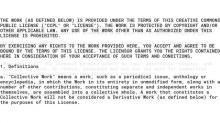 Super Man and the Bug Out
Super Man and the Bug Out For the Win
For the Win A Place so Foreign
A Place so Foreign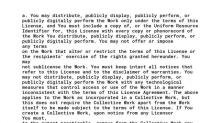 Shadow of the Mothaship
Shadow of the Mothaship Return to Pleasure Island
Return to Pleasure Island Party Discipline
Party Discipline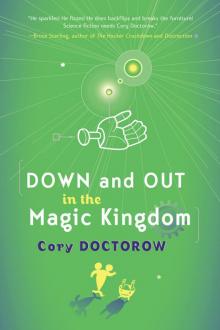 Down and Out in the Magic Kingdom
Down and Out in the Magic Kingdom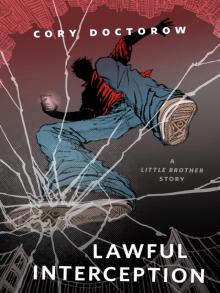 Lawful Interception
Lawful Interception Homeland
Homeland Eastern Standard Tribe
Eastern Standard Tribe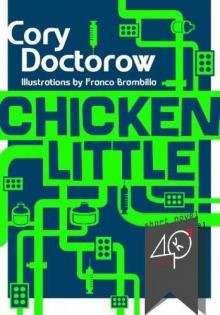 Chicken Little
Chicken Little I, Row-Boat
I, Row-Boat Makers
Makers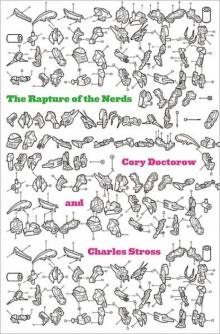 Rapture of the Nerds
Rapture of the Nerds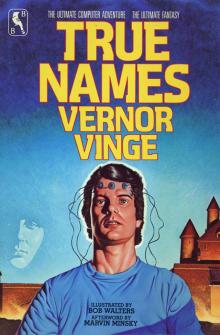 True Names
True Names